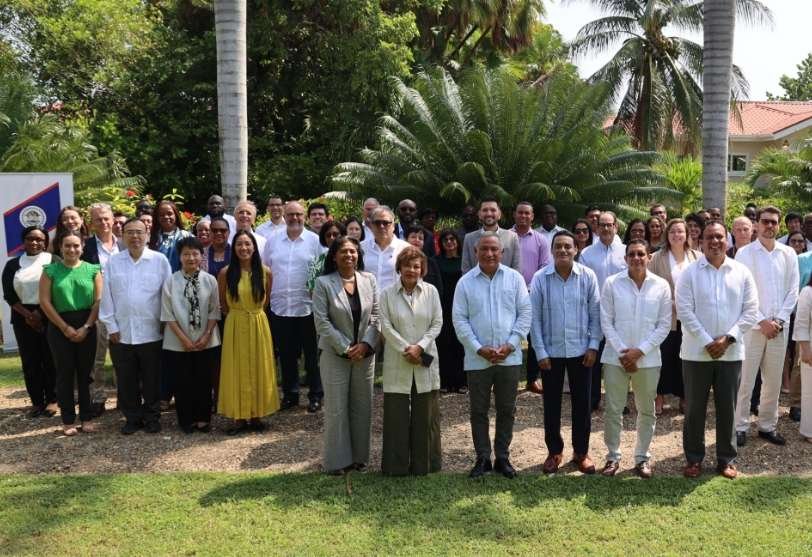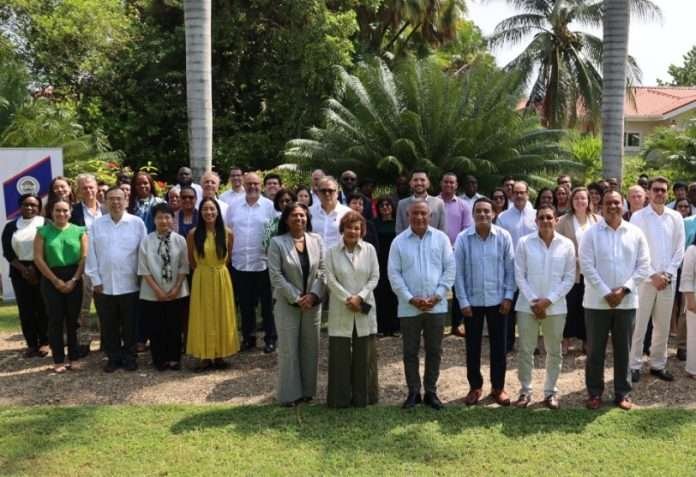– Advertisement –
The Government of Belize is hosting the Strategic Alliances International Partners Conference in Palencia, Belize under the theme “Unlocking Climate Finance and Disaster Risk Financing for Sustainable Development.”
The Conference is a significant event aimed at fostering financial collaboration between nations for sustainable development.
Small nations often face several challenges when trying to secure funding for climate projects. These difficulties include:
- Limited Access to International Funds: Many small nations struggle to access global climate finance mechanisms like the Green Climate Fund (GCF) due to complex bureaucratic requirements. Applying for these funds often requires navigating extensive administrative processes and meeting stringent eligibility criteria, which can be a significant burden for countries with limited human and financial resources.
- High Transaction Costs: Preparing project proposals and meeting the detailed requirements for international funding agencies can be costly. For smaller nations, which often lack the technical and administrative capacity to handle such processes, this can be a major barrier.
- Lack of Technical Capacity: Smaller nations may lack the necessary technical expertise to design, implement, and monitor climate-related projects. This makes it difficult for them to meet the requirements of international financial institutions, which typically require detailed risk assessments, economic analyses, and long-term plans to evaluate the feasibility of projects.
- Competition for Funds: Global climate finance is competitive, with many nations vying for a limited pool of funding. Larger or more influential countries often have an advantage in securing financing, leaving smaller nations at a disadvantage.
- Vulnerability and Risk Perception: Small nations, especially island states, are highly vulnerable to the impacts of climate change, such as rising sea levels and extreme weather events. However, the perception of risk and the scale of investment required may discourage large financial institutions from investing in these areas, as they might see smaller economies as too risky for large-scale investments.
- Debt and Financial Instability: Many small nations already face high levels of debt, which limits their ability to borrow money for climate projects. They may not have enough financial stability to attract investors, leading to a reliance on grants rather than loans, which are more difficult to secure.
- Political and Governance Challenges: Weak governance structures, political instability, and corruption can also hinder small nations from accessing climate finance. Donors and international institutions may be reluctant to provide funding without assurances of transparency, accountability, and effective management of resources.
- Uncertainty of Climate Finance Flows: Although there is global recognition of the need for climate finance, actual disbursements often fall short of commitments. Small nations may struggle with inconsistent or delayed funding, making it difficult to plan and implement long-term climate projects.
These challenges highlight the need for international cooperation, capacity-building efforts, and simplified access to climate finance for smaller nations.
The conference, organized by the International Cooperation Council (ICC) within the Ministry of Foreign Affairs and Foreign Trade (MFAFT), focuses on climate finance and disaster risk financing, essential for building climate resilience and supporting sustainable growth in Belize.
The theme for this year’s conference is “Unlocking Climate Finance and Disaster Risk Financing for Sustainable Development.”
The two-day event gathers international partners, government leaders, and experts to find new ways to finance climate projects. Key discussions focus on how to access global climate funds, build local expertise, and create partnerships for protecting the environment.
This conference is closely aligned with Belize’s Medium-Term Development Strategy, especially its focus on environmental conservation.
The event was opened this morning by John Briceño, Prime Minister of Belize, and featured remarks by Francis Fonseca, Minister of Foreign Affairs, Foreign Trade, Education, Culture, Science and Technology, and H.E. Amalia Mai, Chief Executive Officer in the Ministry of Foreign Affairs and Foreign Trade.
It aims to strengthen dialogue with Belize’s development partners and enhance collaboration on initiatives for sustainable growth.
The conference, organized by the International Cooperation Council (ICC) and the Ministry of Economic Development, focuses on Belize’s key goals in climate finance and disaster risk management. It aligns with the country’s environmental protection objectives under its Medium-Term Development Strategy.
The event provides a space for Belize to collaborate with international partners to explore new ways to fund climate projects and strengthen the country’s ability to handle environmental challenges.
Over two days, participants will discuss important topics such as unconventional methods of climate financing, accessing international funds, building local capacity, and creating opportunities for partnerships.
Sources: San Pedro Sun, Press Office of Belize .
– Advertisement –





















